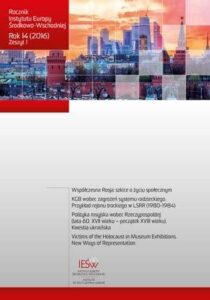Pages: 35-65
Edition: Lublin 2016
DOI: --
Citation method: A. Bobryk, KGB wobec zagrożeń systemu radzieckiego. Przykład rejonu trockiego w LSRR (1980-1984), „Rocznik Instytutu Europy Środkowo-Wschodniej”, 14 (2016), z. 2, s. 35-65.
Abstract:
In the USSR, including Lithuania, which was annexed in 1940, repression was the key tool used by the establishment to eliminate from the society any potential threats to the system. One of the key services was the KGB (eng. CSS = Committee for State Security). Its operation is presented with the Trotsky Region as an example. This administrative unit was characterised with a multinational population, and somehow peripheral location, yet still close to the capital of the Republic. Its unique character was emphasised by higher touristic activity resulting from the appeal of its cities and its position on the main route from Poland to Vilnius. As the possibilities to visit the country by people of other nationalities were limited, this was a very important factor for the secret services. The period which was analysed is 1980-1984. This was a particularly specific time as frequent changes in the key positions in the Communist Party took place at that time. During this period a slow change in the defined spheres of threat can be observed. Although the KGB activity was initially focused largely on surveillance of people who had been involved in anti-system activities decades earlier and most of whom had served jail sentences and on searching for the activity of the western intelligence, it later became a response to the challenges of the current times. They resulted largely from the effect of the changes taking place in Poland on the attitudes of the Russian citizens. This concerned the issues of achieving better working conditions through protests, the emerging criticism of the system and the aspirations to gain more civil liberties.

PDF: Download